Peter Welch had a straight-shooting editorial in the Times Argus yesterday, on the pressing need to fire Secretary of Defense Donald Rumsfeld.
It was particularly impressive when laid side by side with the mush-mouthed stuff dribbling from the Rainville camp on this and other Iraq-related issues. Rainville feels that firing Rumsfeld might cause “turbulence” — which is funny, because VDB might be tempted to call the situation we have now (2300+ dead and 17,000 wounded American soldiers, civil war brewing) somewhat turbulent.
Especially given that as of today, the insurgency is suddenly only the second largest problem for US forces in Iraq. “American officials are now saying that Shiite militias are the No. 1 problem in Iraq, more dangerous than the Sunni-led insurgents,” according to the Times.
In any event, below is my own take on the issue — decidedly roundabout, as always.
Notes from the New Vermont
Commentary #178: Rumsfeld Gets Cuffed
Like a lot of people, I almost never remember to shop ahead of time or in bulk. Instead, I tend to shop when I’m fresh out of work, late for dinner, and ravenously hungry — utterly defenseless.
The big chain grocery near my house knows this about me, and they put out cheese cubes and bits of roast beef and smoked turkey in a little glass case in front of the deli. This case stands just at hand-level, like an oversized mouse trap, and I’ve bought hundreds of pounds of smoked turkey over the years.
But over those same years, I’ve also developed counter-strategies. On my first run past the sample case, for instance, I pick up what looks like one cheese cube and one slice of turkey. But really each cube and slice is holding a duplicate cupped against my palm.
After eating these, I’ll make a long looping turn at the Dairy section and come back to work the same pathetic magic trick one more time.
Only then do I break down and buy a pound of each.
I know the store still wins in the end, but the point is: It’s wicked good turkey.
The other night, though, as I’m about to strafe the sample case for the second time, something catches my eye as I pass the Pharmacy. It’s an older man in glasses and a sharp pinstriped suit, gray at the temples, and at first I think he’s having some sort of a seizure. He’s sitting at the automatic bloodpressure machine, after all, and as I glance over he yanks hard once, and then twice, three times, on the arm locked into the beige plastic cuff.
But then the guy slumps back in the chair like he’s winded, and it dawns on me: he’s trapped in there. The blood pressure machine sits behind a little ficas tree meant to provide privacy — and obviously once it inflated, the cuff never deflated.
Maybe he’s been there for hours.
So I roll my cart over to the ficas, and as I come around the little branches, I get my second epiphany: this trapped guy is not just a guy, it’s Donald Rumsfeld.
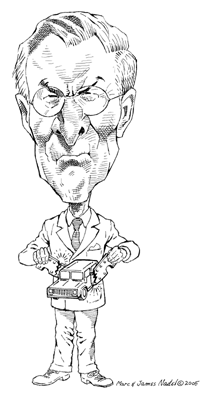 Secretary of Defense Donald Henry Rumsfeld.
Secretary of Defense Donald Henry Rumsfeld.
There’s this awkward pause, so I introduce myself and then I say, “How are you, Secretary Rumsfeld?”
And he looks up and gives this tight grin, and then he says, “Never better, son. This is one hell of a grocery store. I don’t get up this way much, but I’m enjoying this place. Produce selection is just first-rate.”
There’s another pause. He hasn’t mentioned the cuff, and so I feel odd mentioning it for him, but he’s clearly trapped. The hand sticking out of the cuff has gone bloodless and white.
“Can I help you out of there, Mr. Secretary?” I ask.
He squints through the glasses. “Out of where? I’m afraid I don’t follow you.”
“Your arm,” I say. “It seems like you’re — you know, stuck in the blood pressure cuff.”
He follows my gaze, as though I’ve pointed to a quarter someone dropped on the floor. Then he squints up at me again. “These machines take time, Phil. They deflate at their own pace.”
“I know, but you look stuck,” I say. “I mean, you were really yanking on it before.”
Rumsfeld thinks, then says, “I like to simulate stress. Just to make sure the circulatory system’s battle-ready.”
I figure I should just leave, but my conscience nags me, and I say, “So you’re all right, then?”
Rumsfeld squints, and this time all of the wrinkles on his face seem to surface at once. He seems simultaneously old, and impassioned, and desperately tired. And then he just starts asking questions, and answering them, one after the other. “Is this blood pressure cuff operating at peak efficiency, Phil? No, clearly it isn’t. Do I wish I were free to get up now and finish my shopping? Darn right I do. Will I eventually be roaming the aisles and picking out some fresh herbs and arugula for my salad tonight? Absolutely, Phil. Oh, absolutely.”
And that seems to be all there is to say. So I sort of shake the hand sticking out of the pressure cuff, and Rumsfeld nods and looks quickly away, and I leave him there, behind the ficas tree in the Pharmacy.
I start my loop back to the sample case, but as I near it, I sort of lose my appetite and wheel past. I try to convince myself that it’s someone else’s job, ultimately, to get the guy out of there.
But still — there’s a little voice in my head that says I should just have hauled him out when I had the chance, whether he wanted the help or not.
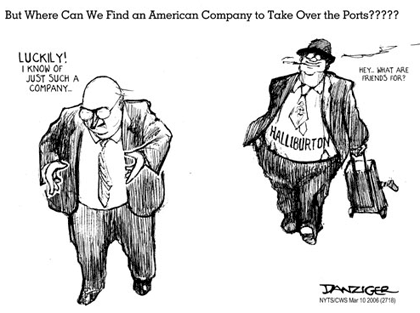
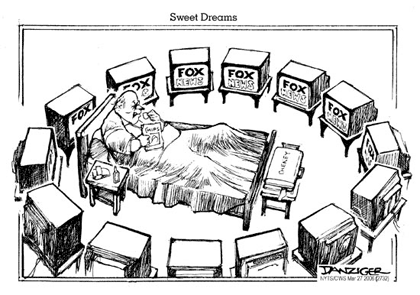
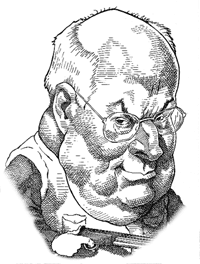 Which is to say he’s read all of the brutal editorials they’ve run about his energetic support for allowing torture by the CIA, and other US forces.
Which is to say he’s read all of the brutal editorials they’ve run about his energetic support for allowing torture by the CIA, and other US forces. Secretary of Defense Donald Henry Rumsfeld.
Secretary of Defense Donald Henry Rumsfeld.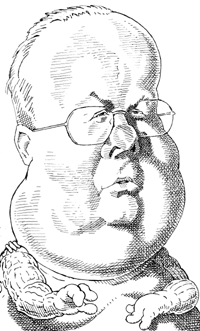 “In a brief interview, Mr. Rove dismissed the notion that he was fatigued or had lost his touch.
“In a brief interview, Mr. Rove dismissed the notion that he was fatigued or had lost his touch. Barbara has now gone herself one better: she’s donated money to the Katrina Relief fund — but stipulated that it go in roundabout fashion to son Neil.
Barbara has now gone herself one better: she’s donated money to the Katrina Relief fund — but stipulated that it go in roundabout fashion to son Neil.